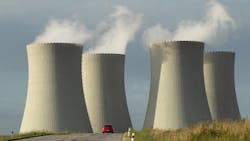Staying Nuclear: France Seeks to Salvage an Industry
PARIS — France faces a unique challenge as it moves to save nuclear reactor manufacturer Areva and salvage one of its world-class industries and jobs, while at the same time reducing its own reliance on atomic power.
The French presidency on Wednesday endorsed merging Areva’s reactor-building unit with state-owned electricity company EDF, adding that the government would spend “as much as necessary” to recapitalize the troubled nuclear group, which is also controlled by the state.
Economy Minister Emmanuel Macron said Thursday that the government aims to “stabilize, save” the nuclear industry, which he hailed as “an industry of the future in France and abroad.”
France has the world’s second-largest nuclear sector and generates a greater proportion of its own electricity through nuclear power than any other economy — around 75% of its power needs.
It has also made the export of nuclear technology an economic priority, with Areva and EDF promoting the European Pressurized Reactor (EPR), a third-generation reactor design that France considers the most advanced and safest in the world.
However, the future of the industry has been clouded since countries have moved to reduce or eliminate nuclear energy since the 2011 Fukushima disaster in Japan. Germany, for example, intends to completely phase out nuclear power by 2022, and a rising Greens movement has encouraged France to cut its dependence, with legislation near final adoption aiming to reduce reliance on nuclear plants to 50% by 2025.
Meanwhile, Areva has run into major difficulties with the construction of its first EPR reactor in Finland, which is now expected to begin operating only in 2018, nine years late, causing Areva nearly 4.0 billion euros ($4.5 billion) in losses.
And it was recently discovered that the lid of the reactor vessel that Areva manufactured for EDF’s EPR reactor in Flamanville, France, has a serious manufacturing defect, which means it may not be nearly as resistant to shocks as required.
The clouds over the nuclear market and the manufacturing problems have led to a meltdown in the finances of Areva, 87% of which is owned by the French state.
In March, Areva reported a record net loss of 4.8 billion euros ($5.4 billion) in 2014 as it absorbed costs linked to delays, and said it would make savings worth around 1 billion euros ($1.13 billion) over the next few years.
And in May, Areva said it would cut up to 6,000 jobs worldwide as it seeks to slash its costs by 1 billion euros by 2017.
A New Outlook for the Country
Following the government’s announcement, EDF will now have a month to hash out the terms of absorbing Areva NP, the reactor subsidiary that employs around 15,000 of Areva’s total workforce of about 45,000. Areva would then focus on uranium extraction, enrichment and reprocessing.
“The challenge isn’t merely to respond to financial difficulties that Areva might encounter, but to restructure the entire sector and give it a new outlook,” said an official close to president Francois Hollande on Wednesday.
Macron said that “the French camp needs to work together internationally,” adding that Areva and EDF “had too often in the past competed against one another.”
According to French business daily Les Echos, EDF has offered to pay just over 2 billion euros ($2.26 billion) to become the main owner of Areva NP, a figure that has been neither confirmed nor denied by the two companies involved.
The merger of reactor operations might attract other potential investors to Areva.
A Paris broker who asked to remain anonymous called the offer low, saying Areva’s reactor business was worth more like 4.5 billion euros ($5.1 billion).
EDF, in which the state still owns 84.5%, also doesn’t want to find itself on the hook for losses connected with the Finnish reactor.
French Energy Minister Segolene Royal said Thursday that “we must make a complete inventory of the needs” of the sector and “other resources that could be mobilized.” The broker estimated the merged company’s long-term financing needs at 7 billion euros ($7.89 billion).
Officials also moved quickly to quash speculation that EDF would be compensated for losses from taking on Areva’s reactor unit by the state raising regulated electricity prices, which EDF has recently complained are too low.
“There is no connection between this operation and electricity prices,” Macron said.
With a record 3.5 million people out of work and the economy barely growing, the French government has taken an active role in ensuring its industrial giants don’t stumble. It was intimately involved last year in ensuring most of Alstom’s energy business will stay in France with its 12.4 billion euro acquisition by General Electric ($14.0 billion).
French officials also insisted that Nokia preserve jobs in France when it struck in April a 15.6 billion euro deal ($17.6 billion) to buy its rival Alcatel-Lucent to create the world’s biggest supplier of mobile phone network equipment.
By Richard Lein and Marie Heuclin
Copyright Agence France-Presse, 2015
About the Author
Agence France-Presse
Copyright Agence France-Presse, 2002-2025. AFP text, photos, graphics and logos shall not be reproduced, published, broadcast, rewritten for broadcast or publication or redistributed directly or indirectly in any medium. AFP shall not be held liable for any delays, inaccuracies, errors or omissions in any AFP content, or for any actions taken in consequence.
